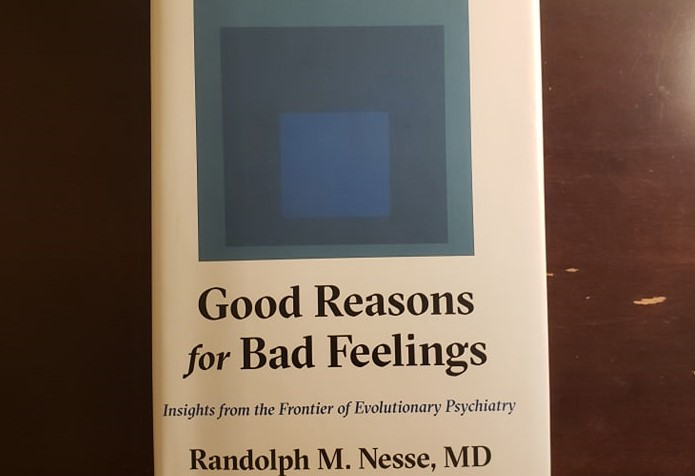“Nice talk, Randy…of course, they had no idea what you were talking about”, exclaimed the famous evolutionary biologist and paleontologist Stephen Jay Gould to the psychiatrist Randolph Nesse on how evolution might explain the origins of mental disorders. And, in a sense, Gould was right! Nesse was one-of-a-kind, and applying the theory of evolution to his field of psychiatry was an innovative way of looking at how some mental disorders arise in humans. But, as Gould replied, “There is no point in talking about how the evolution of something like mental disorders without first explaining evolution.” In his new book, Good Reasons for Bad Feelings: Insights from the Frontier of Evolutionary Psychiatry, Nesse set outs to explain his plea and to make the connection that he has worked out for his whole career.
Good Reasons for Our Bad Feelings According to Randolph Nesse
The Birth of Evolutionary Psychiatry
Nesse was disturbed on how psychiatry was a field of hopelessness, giving patients bogus explanations for their mental disorders and setting them on a path of confusion. So, Randy, as his friends call him, embarked on a journey on how understanding our origins as a species and our ancestors can give us clues on how some mental disorders may have arisen in humans. The book expands on several disorders, including eating disorders and drug abuse.
As Nesse explains, psychiatry has a bad reputation. He explains how psychoanalysis opened the door for many theories that cannot be tested and how the top chairs in America’s top universities were held by experts in psychoanalysis. This path of several theories and not concrete explanations for bad feelings made one of Nesse’s patients, Ms. A, say, “Your whole field is confused. You know that, right?” And in a way, this was where evolutionary psychiatry and Nesse’s long search for evolutionary explanations for mental disorders began.
Good Reasons for Bad Feelings is a compelling argument for such a link. Nesse meticulously goes over every disorder treated by a psychiatrist and tries to find the evolutionary link to them. The book is deeply researched, with Nesse providing over 900 footnotes! He doesn’t leave any stone unsearched.
Evolution and Mental Health
Another fact that jumps out of the book is Nesse’s deep understanding of evolutionary biology. He worked with famous evolutionary biologist George Williams, even publishing the innovative book on evolutionary medicine, Why We Get Sick: The New Science of Darwinian Medicine. After concentrating on Darwinian medicine, evolutionary psychiatry was next. As he states in the early pages of the book on why we need to shift towards evolution to uncover the origins of our bad feelings, “An evolutionary view explains why we have desires, why we can’t satisfy them, and why it is so hard to set them aside: our brains were shaped to benefit our genes, not us.”
In his new book, Nesse goes on to touch anxiety, depression, bipolar disorder, PTSD, panic disorders, among others. On “Why Does Anxiety Exist at All?” he explains, “The general answer is obvious enough: individuals with a capacity for anxiety are more likely to escape from a dangerous situation now and to avoid them in the future.” He introduces his “Smoke Detector Principle” in which “systems that regulate protective responses such as vomiting and pain turn the response whenever the benefits are greater than the cost, even if it means false alarms.”
On depression, he puts forward the possibility that these low moods help us to move on and not stay in one fix place or feeling. But, Nesse gives caution to this view too, as he repeats in several chapters, you should not view “mental disorders as adaptations.” Instead, Nesse gives various reasons and some outstanding links between evolution and the side effect that are mental disorders.
Successfully Linking Psychiatry and Biology
In a sense, Good Reasons for Bad Feelings by Randolph Nesse, is another book, a good and solid one, on the search of pinning mental health, especially psychiatry, to some biological roots. Nesse is an outstanding scientist, with an unusual combination of understanding complex evolutionary theories, linking them to mental disorders and in the end, not getting too cozy with some of them. If nothing else, this book yells “caution and further research.” Nesse is a lone explorer in a field needing a lot of good researchers to uncover the mysteries of how sometimes we feel bad and why on several occasions, it persists for a long time.

